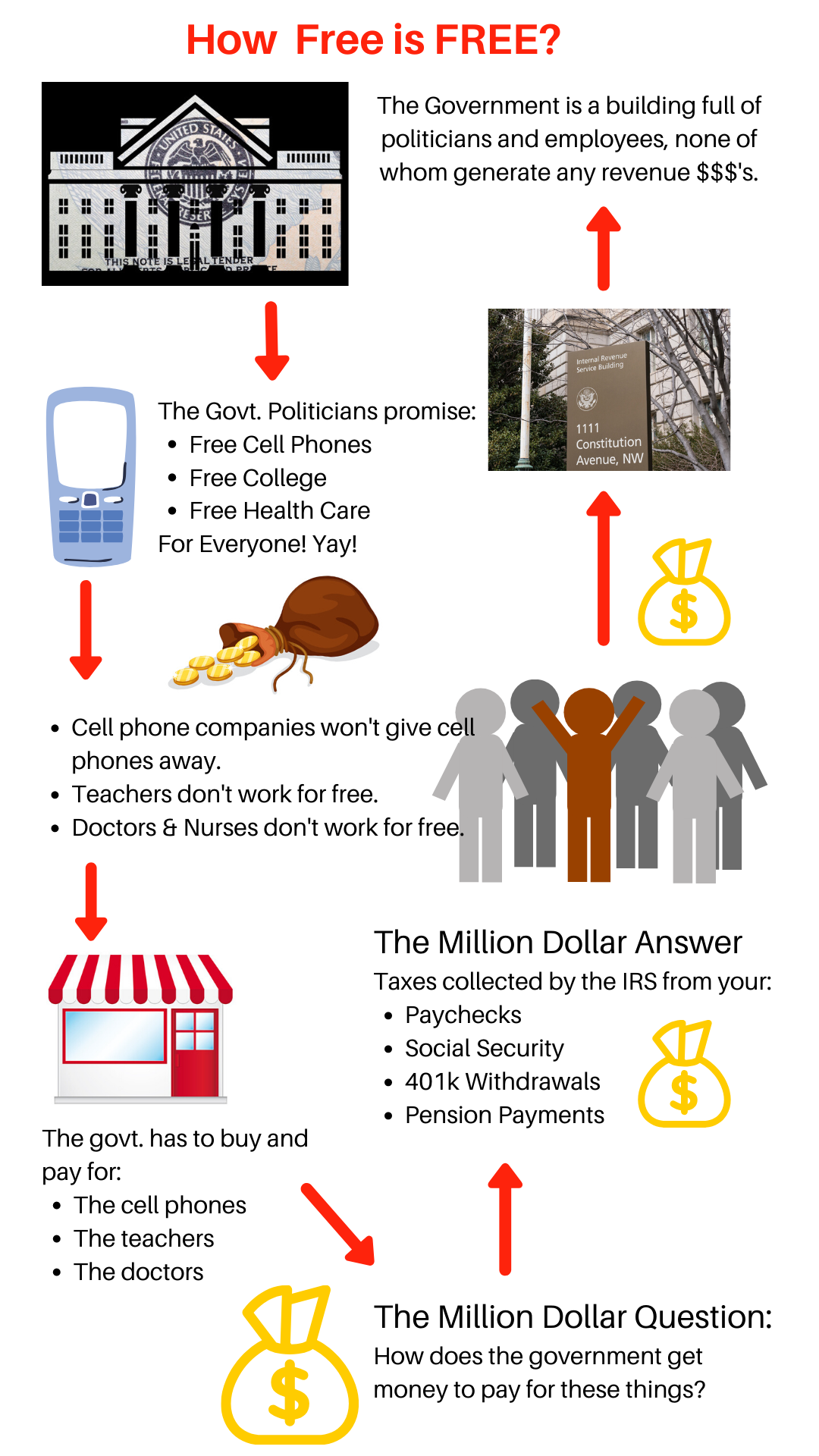Economic Rule Number One
The govt doesn’t generate revenue. That means no one working in the Capitol sells a product or a service for which they charge a fee. Period.
Economic Rule Number Two
We will eventually run out of other people’s money. And here is why.
Ahhh Romance! The most romantic belief I hear these days is that many people believe that turning the US into a socialist country is going to be a good thing. After all,
“Look at all the other countries that have free medical care for all and free college for all. It works in France and Canada and Sweden and all those other countries so it can work here.”
Surprise! 11 Socialist Countries
This might be a good time for me to share the names of the 11 countries most often referred to as socialist* in the world:
- Bangladesh
- China
- Guyana
- India
- Laos
- Nepal
- North Korea
- Portugal
- Sri Lanka
- Tanzania
- Vietnam
*This list seems to change depending upon the source. So I’ve put together a list of the countries that appeared most often in various sites I came across in my search.
This is one source: Socialist Countries 2020
Have you ever heard about all the poverty and hate for the leaders in these countries? Are these the countries on which you’d really like to model the United States? Would you really like to live in any of them?
Keep in mind that many people from these countries are always trying to get out of there and into the US.
Where Do All Governments Get Their Money?
 All governments in the world collect taxes from the citizens and they collect tariffs (which is a tax on foreign imports).
All governments in the world collect taxes from the citizens and they collect tariffs (which is a tax on foreign imports).
The more tax government officials decide to collect from citizens, the less money each citizen has in their bank account with which to pay bills, buy food, save for their retirement and/or a kid’s college fund, or spend on extracurricular activities or vacations.
Many citizens in our United States already struggle to pay bills and feed their families. When those funds get decreased (for reasons that do include higher income taxes), they are in a category labeled as “poor.” As a result, many of those poor citizens find themselves in the position of having to depend on government assistance programs in order to feed their families.
Economic Rule Number Three
He who has the most money has all the control. Yep, very simple and very true.
This point was really driven home with me when I was once married to a man who spent a lot of time telling me that since he made more money than I did, his decisions were always the final decisions. So, guess how many wealthy men (and very few women) run governments. (Yes, that’s rhetorical.)
Government Programs Have Rules too!
Anyone who has ever had to depend on a government program knows that all those programs have rules or guidelines that must be followed. Those rules and guidelines can be changed at will and the citizens who depend on them, have no say in such things. Any citizen who breaks a rule or doesn’t follow said guidelines will be kicked out of the program.
One of the rules of many government programs is that if you make a salary over a certain amount, you no longer qualify to collect money from those programs. For instance, if you want to get food stamps, you cannot make any more than $1,000 per month. The same type of rule applies if you want to live in a government-subsidized apartment. Oh, and you have to drain all liquid assets (savings, retirement, etc) and sell any assets with any value before you can even qualify for most government assistance.
Can you tell I’ve had to do this once before in my life? I was even told to sell my car and live off that money for a while, then come back and reapply for welfare and food stamps. I ended up living off my credit cards for six months instead because I needed my car to get to a new job when I got one.
Now, have you ever heard there are multiple generations of people who have figured out if they follow all the rules, they can basically live for free off the government? My situation is exactly how this can happen: if I had sold my car, I would have had no way to even apply or show up for an interview for a job. It’s a fact that I have multiple extended family members who live like this.
Here’s How it All Ties Together
Our federal government could encourage our individual state governments to keep millions of people home from work to prevent the spread of a virus with a 99.98% survival rate. This behavior will cause the following results:
- More businesses to go belly up,
- More people will lose their jobs, and
- Therefore, more people will become reliant on government assistance.
That’s a TON more people having to follow government rules in order to pay their bills and feed their families. Extracurricular activities, entertainment and vacations will continue to be wiped out of the picture therefore killing those companies and putting more people out of work.
Bottom Line
With those three things continuing to happen there will continue to be fewer businesses and fewer people who will be paying taxes to the government.
How Do You Suppose the Government is Going to Make Up That Shortage?
Well, they’ll have to keep raising taxes on the fewer businesses and workers that are left. All citizens of socialist countries pay 50-60% of their paychecks in govt taxes. Even those who are not living in socialist countries but have to pay for extreme socialist programs such as “free” medical care for all, pay this much in personal income taxes to support them.
How Do You Suppose Corporations Will Make Up the Cost of Their Higher Taxes?*
When a POTUS says he wants to tax the rich (those making over $400,000 a year) and corporations. let me explain why this will cost you more money than it will cost the corporations.
Let's say Walmart makes a billion dollars a year, and the POTUS decides to take away 10% of that. Do you really think the powers that be at Walmart will say,
"Wow - what a great thing it is that we make less money!"
Probably not.
So what will they do to make up that hundred million dollars?
You got it: they will raise the prices. But because of the "new" tax structure, they will need to raise prices about 12% to recover that hundred million the POTUS took, for the government. Not only that you will pay higher prices, but you will also pay additional sales tax because the retail price is higher -- So that 10% the POTUS took from the corporations, will cost YOU between 12% and 15% depending on where you live.
Now you might say well the rich will pay the higher price too, and you are right, but here is the catch:
The average working person spends 98% of his or her income mostly just to live, while the wealthy spend roughly 60% of their income. Taxing corporations benefit the rich, shifting the tax burden to the middle and lower class, but in a sneaky, roundabout way by raising their prices.
*Some of the text in this and the next section was copied from a FB post with no information as to its origin. If anyone recognizes it, please let me know who wrote it so I can give credit where credit is due.
Well, What About Taxing People with Incomes Over $400,000?
These are doctors, lawyers, business owners, maybe even the guy that owns the company you are working for. None of these people got up this morning willing to accept less money at the end of the week, so what will they do?
- Raise the prices for their services,
- Layoff more employees,
- Freeze wages,
- Cut benefits,
- Cut hours, or more likely,
- A combination of all of the above.
Again, guess who is paying the tab in the long run? YOU!
Don't be fooled by promises of free stuff or more government benefits, there is no such thing as a free lunch: you WILL pay for it all in the end. And if you get politicians involved there will be a massive "Administration fee" meaning you will pay even more and get less.
In easy-to-understand terms, you will make less and pay more in this type of plan because the burden always comes back to the 99% that are not in the 1%.
What it Looks Like to Depend on Government Programs to Live
The millions of newly minted unemployed people will now have to depend on government programs which means they will face a few more hurdles:
- They will have a hard time finding a new job because a lot of businesses have closed thus cutting the number of available jobs.
- f they do find another job, it may take 1-2 months to get back on their feet with a new, higher salary so they’ll still need the govt assistance to help them get caught up during that time.
- Taking out any kind of personal loan will be nearly impossible because people’s credit was probably ruined when they lost their job and could no longer pay their bills.
But, they have restrictions regarding the amount of money they can make while collecting that assistance so they’ll be cut off in the first two weeks of that new job if they’re honest on the govt forms.
Soooo living on that new job in the first two months is gonna be tricky especially since people had to drain their savings before they could even qualify for the program. For this reason alone, in many cases, it’s more cost-effective for many to stay home and collect on the government programs.
And boy, all these now unemployed and increasingly poor people will become extremely desperate and highly dependent upon those government programs.
The big problem here is that with fewer businesses and fewer people working, the US will now have a lot less money going into the government’s tax bank accounts.
Again: How Do You Suppose the Government is Going to Make Up That Shortage?
Well, they’ll have to keep raising taxes on the fewer businesses and workers that are left.
And That brings us back to:
Economic Rule Number One:
The govt doesn’t generate revenue. That means no one working in the Capitol sells a product or a service for which they charge a fee. Period.
Economic Rule Number Two
We will eventually run out of other people’s money.
Ahhh how romantic to depend on the government for anything and everything, right? Sighhhhhh.
So where does that leave what used to be the hardest working, most innovated citizens of the United States?
Good question.
My Thoughts
- Watch what you wish for.
- Don’t ever vote with your feelings.
- Vote with a clear understanding of your personal household economy, who you need or want to depend on for your lifestyle, and the cost of all those pie-in-the-sky dreams that someone else will pay your way at no cost to you.
Get all your facts together before you go and vote!!
I hope this information helps you to understand how the money goes round in this country: from the worker to the government, to the government programs and how it really affects your personal bank account.
If you have any questions, thoughts or would like to share more information on this topic, please leave a comment below. And please, be kind.
Sincerely,



 Tom & I had to take a drive out to Ca this weekend to help my son’s friend with some computer problems. Last night when we were discussing the best route to take back, Tom suggested we go the “long” way via 395 thru Death Valley and blow by Scotty’s Castle. (Legend has it that it was built by Walter Scott, aka, “Death Valley Scotty,” with the money from his rich, secret gold mines. In reality it was built by his partner, Albert Mussey Johnson as a vacation home for his wife, Bessie.)
Tom & I had to take a drive out to Ca this weekend to help my son’s friend with some computer problems. Last night when we were discussing the best route to take back, Tom suggested we go the “long” way via 395 thru Death Valley and blow by Scotty’s Castle. (Legend has it that it was built by Walter Scott, aka, “Death Valley Scotty,” with the money from his rich, secret gold mines. In reality it was built by his partner, Albert Mussey Johnson as a vacation home for his wife, Bessie.)
 Oh, and some had pay phones for a nickel or a dime. (Remember “collect calls?") No candy bars, no chips, no Subway Sandwiches or McDonalds, ha! Nothing! I’m not even sure McDonald’s was invented yet…maybe you can find that out.
Oh, and some had pay phones for a nickel or a dime. (Remember “collect calls?") No candy bars, no chips, no Subway Sandwiches or McDonalds, ha! Nothing! I’m not even sure McDonald’s was invented yet…maybe you can find that out.  Occasionally we were allowed to buy a bottle of pop (aka “soda”) at the gas station but usually it was just water. And nope, no individual plastic bottles, it was Dad’s canteen. He would refill it at gas stations along the way and we’d all get a sip or two. Oh, I don’t remember any ice chests either; everything was either desert hot or lukewarm at best. Can you just imagine three kids, not seat-belted in, playing in a chest full of ice as we’re barreling down the highway? Ha – no way we would have lived to see the end of that trip!
Occasionally we were allowed to buy a bottle of pop (aka “soda”) at the gas station but usually it was just water. And nope, no individual plastic bottles, it was Dad’s canteen. He would refill it at gas stations along the way and we’d all get a sip or two. Oh, I don’t remember any ice chests either; everything was either desert hot or lukewarm at best. Can you just imagine three kids, not seat-belted in, playing in a chest full of ice as we’re barreling down the highway? Ha – no way we would have lived to see the end of that trip!  On the way we found an interesting little town out in the middle of nowhere called “Trona.” Trona is actually located at the western edge of Searles Lake which is a dry lakebed from which they mine “trona.” That, in case you don’t know, is a pink colored sodium carbonate (salt). Look it up, it’s pretty interesting.
On the way we found an interesting little town out in the middle of nowhere called “Trona.” Trona is actually located at the western edge of Searles Lake which is a dry lakebed from which they mine “trona.” That, in case you don’t know, is a pink colored sodium carbonate (salt). Look it up, it’s pretty interesting. 

